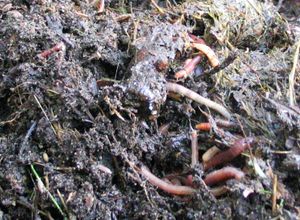Difference between revisions of "Compost"
| Line 1: | Line 1: | ||
[[Image:CompostWithEarthworm.jpg|thumb|right|300px|Compost with Earthworms]] | [[Image:CompostWithEarthworm.jpg|thumb|right|300px|Compost with Earthworms]] | ||
| − | '''Compost''' is vital in growing [[plants]]. Compost can be made from [[waste biomass recycling|organic waste]], and enriched with chemicals such as [[ammonia]]. [[funeral|Dead bodies]] may be a part of compost. | + | '''Compost''' is vital in growing [[plants]]. Compost can be made from [[waste biomass recycling|organic waste]], and enriched with chemicals such as [[ammonia]]. [[funeral|Dead bodies]] may be a part of compost. But recycling the dead might be more ceremonial than practical. Each setters consumes about 2.7 kg of food per day, and rejects about 2kg of waste. This is about 730 kg per year, or ten times the settler's body mass. |
| + | |||
| + | Biomass from food production can also be included in compost as well as animal wastes. Most compost is biomass. Compost will be competing for use of biomass with the plastics industry. | ||
| + | |||
| + | Contamination of compost needs to be addresses as the compost minerals end up in the food chain. | ||
| + | |||
| + | Composts that include biological and meat wastes should be heat treated to kill dangerous bacteria. | ||
[[Category: Agriculture]] | [[Category: Agriculture]] | ||
Revision as of 08:49, 21 May 2019
Compost is vital in growing plants. Compost can be made from organic waste, and enriched with chemicals such as ammonia. Dead bodies may be a part of compost. But recycling the dead might be more ceremonial than practical. Each setters consumes about 2.7 kg of food per day, and rejects about 2kg of waste. This is about 730 kg per year, or ten times the settler's body mass.
Biomass from food production can also be included in compost as well as animal wastes. Most compost is biomass. Compost will be competing for use of biomass with the plastics industry.
Contamination of compost needs to be addresses as the compost minerals end up in the food chain.
Composts that include biological and meat wastes should be heat treated to kill dangerous bacteria.







